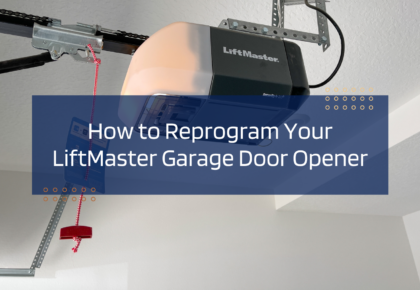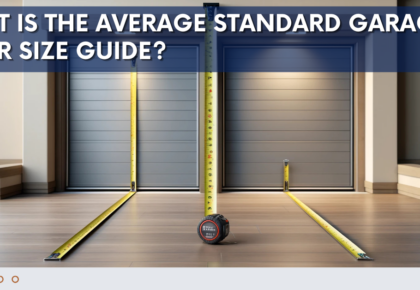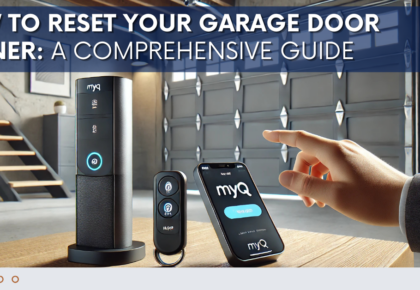Selecting the appropriate garage door for your house could be pretty overwhelming because of the different choices available. A garage door should not only provide appeal to your house’s exterior but also assure functionality and security. In this comprehensive guide, we will walk you through everything that can help you choose an appropriate garage door for your needs.
How to Choose the Right Garage Door for Your Home
While selecting a garage door, consider the door material, its appearance, its insulation ability, and your budget. An appropriate garage door can enhance your home significantly from an architectural perspective while fulfilling security concerns and staying within budget.
Material Matters
The garage door can be made from a variety of materials; all have their pros and cons:
- Steel: They are strong, and little maintenance is required. Most come in a variety of styles and colors. Steel doors show excellent weather resistance and can be insulated for energy efficiency. However, they can dent and need periodic touch-up painting to forestall rusting.
- Wood: Gives timeless and classic appeal but needs incessant upkeep. Wooden garage doors come with detailed designs and have natural finishes for the paint job. They provide excellent insulation but are most susceptible to warping and cracking in case treatment and staining are not done regularly.
- Aluminum: Lightweight and rust-free; however, it is not as strong as steel. Aluminum doors find application in big glass panels for front or back doors in modern designs. They are easy to clean but may be dented more quickly than steel.
- Fiberglass: Resistant to dents and corrosion; it also has the advantage of performing better in coastal areas. However, they do crack in cold climates. Fiberglass doors can emulate the appearance of wood without the mountain of maintenance that comes with it. It is lightweight but very tough. However, over time, they can turn brittle.
Style and Design
Choose a style that complements your home’s architecture:
- Traditional: Raised panel doors with symmetrical rectangles. This will fit into many different house designs and be versatile in its insertion.
- Carriage House: This type offers a swing-out appearance with rustic appeal. Most of the designs of the carriage house doors come underlined with decorative hardware and window inserts that add elegance to the house.
- Contemporary: Sleek, contemporary designs having clean lines, washes of glass panels, and others. Contemporary doors are magnificent for modern homes; furthermore, it is possible to have them matched in color and material to your exterior.
Insulation
Insulated doors will help you to save money by merely keeping the temperature in your place, which, therefore, reduces energy costs with noise reduction. So, if the R-values are higher, it has better insulation. In addition, insulated doors can be beneficial in areas where you use your garage as a workspace or have living areas above or adjacent to the garage. They help to maintain your garage at comfortable temperatures during the hottest and coldest times of the year, hence putting less stress on the HVAC system.
Budget
First, determine your budget. Garage doors will vary in price depending on the material used, design, and features. Come up with a realistic budget to prevent overspending on the door. Consider the long-term benefit of investing in a quality door that will help save on maintenance costs by providing energy efficiency.
What is the Best Type of Door for a House to a Garage?
The best type of garage door would depend on what your needs are. One should opt for steel doors, considering durability and low maintenance, wooden ones for traditional looks and pleasing aesthetics, insulated doors for more energy efficiency, and finally, aluminum and fiberglass in coastal areas or modern homes.
What is the Most Popular Style of Garage Door?
By far, the traditional raised panel would be the most popular style of garage door. This style will captivate a wide array of designs in homes. As most people are drawn to it for its classic look and sophisticated feel, so are others with modern architectural tastes by contemporary doors.
What size is the ideal home garage?
The standard garage door size for a single-car garage is typically 9 feet wide by 7 feet tall. For a double-car garage, the standard size is 16 feet wide by 7 feet tall. Measure your garage opening to ensure you choose the correct size.
How Do I Know What Size Garage Door I Need?
Measure the width of your garage opening, height, headroom, and backroom. These measurements together will help indicate the size of the appropriate one. If you are not quite sure or need special arrangements, consult a professional about installation matters about the installation of a garage door.
Does an Insulated Garage Door Truly Make a Difference?
Yes, insulated garage doors can make a massive difference in terms of the energy efficiency and comfort of your home. They permit inside temperature regulation for a garage and reduce heating and cooling costs. Compared to non-insulated doors, insulated ones provide better noise reduction and are more durable. The investment in an insulated door, therefore, is very much worthwhile if you live in a place with extreme temperatures or use your garage for other purposes apart from parking your car.
What Makes a Garage Door More Expensive?
Image alt: New white house with cobblestone driveway and garage with wooden elevation

A few things contribute to the cost of a garage door:
- Material: Using high-end materials, such as wood or custom steel doors, raises the price. A higher price will add more aesthetic appeal and longevity associated with custom finishes and high-quality materials.
- Insulation: The more significant the R-value of a door, the more expensive it is. Better insulation means improved energy efficiency and less noise, so it is worth quite a lot to an owner.
- Design and Customization: Added cost for custom designs, colors, and hardware. Decorative items, windows, and unique styles can bump up the door’s price significantly.
- Size: Larger doors and unique applications will, in most instances, raise the cost. The custom-sized doors can involve unique manufacturing and extra materials.
How Much Should You Spend on a Garage Door?
The average installation cost for many homeowners ranges between $500 and $2,500. At the higher end, custom doors are running upwards of $10,000. Know what your budget is in light of your needs and priorities. Consider what an excellent garage door has to add—better curb appeal, improved security, and energy efficiency.
How Long Does It Take a Pro to Install a Garage Door?
A professional can typically install a garage door in 4 to 6 hours, depending on the complexity of the installation and whether the old door needs to be removed. This includes assembling the door, installing the tracks, attaching the springs, and testing the door’s operation. Complex installations or custom doors may take longer.
Which style of garage door is the cheapest?
For the most part, inexpensive garage doors are non-insulated steel doors with simple designs. While offering some of the durability and low maintenance at much lower costs, such doors will not come close to their insulated brethren regarding energy efficiency and noise reduction. Simple designs do not have fancy decorations and hence have very friendly pockets.
How Many People Does It Take to Install a Garage Door?
Most of the time, installing a garage door requires at least two people to handle the size and weight of these doors. A majority of professional installation crews consist of two to three technicians. Having multiple individuals ensures the safe and efficient installation of the door.
Is Replacing a Garage Door Difficult?
Any replacement of a garage door can be quite a challenge, or even dangerous, due to the door’s weight and the tension in the springs. Installation is always advised to seek professional help from technicians for safety reasons and to work correctly. Professionals have the proper tools and expertise to get the job done right.
Are New Garage Doors Worth It?
New garage doors will improve your curb appeal, be more energy efficient, and increase the security of your home. They can further raise the resale value of your home. Most newer models in today’s garage doors have improved significantly to emphasize safety features, insulation, and designs that accentuate the look and functionality of your home.
How Long Should a Garage Door Last?
In the case of a well-maintained, ordinary garage door, one might get 15-30 years until it has worn out, depending on the material and usage. There, regular maintenance extends its life. Although wooden doors have to be maintained more often than other steel or aluminum ones, in general, all doors are to be checked and serviced periodically.
How Often Do Garage Door Rollers Need to be Replaced?
Garage door rollers should be replaced every 5 to 7 years or if they show signs of wear and tear, such as noise, rough operation, or visible damage. Using high-quality rollers can extend their lifespan and improve the smooth operation of your garage door.
How Often Should I Lubricate My Garage Door?
This keeps all the moving parts of your garage door well-greased—the hinges, rollers, and tracks. Do it every six months to achieve a smooth operation and fewer incidences of wear. Use only high-quality lubricants for garage doors that won’t build up on these moving parts for best results.
Should I Keep My Old Garage Door?
If your old garage door is still in good condition, you can refinance it by installing new hardware or a new coat of paint. However, if it’s outdated, has damage, or inefficiently operating, replace it. Most of today’s garage doors deliver superior insulation from the elements, are more secure overall, and enhance curb appeal.
How Do You Know If Your Garage Door Needs Replacement?
Some of the signs that indicate your garage door needs replacement include:
- Excessively noisy or vibratory operation.
- Frequent breakdowns or malfunctions.
- Evidence of visible damage, such as cracking or warping.
- Poor insulation or increased energy bills.
- An outdated appearance hurts the curb appeal of your home. If you identify with any of these signs, it may be time to invest in a new garage door.
Are garage doors supposed to be serviced regularly?
Yes, frequent maintenance is critical to keeping one’s garage door in good working order. Regular maintenance typically involves lubrication of all moving parts, tests for perfect balance, inspection of springs and cables, track cleaning, and other things as recommended by the manufacturer. Proper timing and maintenance allow you to save money on many repairs and extend the life of a garage door.
Is It Hard to Replace a Garage Door Yourself?
If you have never handled heavy components and tension springs, then a garage door may be relatively challenging and dangerous to replace by yourself. This is why professional installation can also be recommended, and for safety measures, too: a properly installed garage door will work well; proper installation will save one from potential risks resulting from improper operation associated with DIY installation.
From material and style to insulation and budget, how selecting the perfect garage door for your home can make a big difference. Grasping these issues will put you at a better vantage point toward making a decision that clears the way toward enhanced functionality and aesthetic appeal within your home. High-quality garage doors guarantee returns for years whenever one has made an critical investment in their home.








